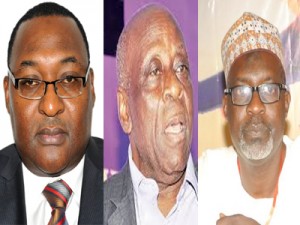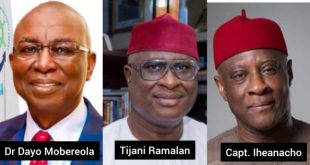
Despite the financial crisis occasioned by the persistent fall in naira and the economic quagmire following the uncertainty surrounding global crude oil prices, there is an enormous potential in Nigeria’s maritime industry to drive economic growth, create massive employment and alleviate the poverty gripping the nation.
Nigeria’s economy thrived on agriculture many years ago and the nation fared better than it is doing presently. However, the maritime sector remains as crucial as agriculture if the nation is to fully diversify and move beyond oil. While there are many potentials, there are also numerous challenges which were highlighted in the recent maritime summit organized by the Nigerian Shippers Council in collaboration with TELL magazine.

MMS Plus brings you the views of several veterans in the maritime industry on various pertinent issues in the Nigerian maritime domain.
Barr. Hassan Bello, the Executive Secretary of Nigerian Shippers Council asserted that most of the problems facing the maritime industry were as a result of government’s inability to guarantee a stable business environment that can assure the foreign companies that there is an appreciable level of certainty about policies before they invest.

Hassan called for a better economic policy by the government to guarantee investors that their investments would not crumble as soon as a new government takes over. He also stressed that the government had to invest massively into the sector
“Government has a responsibility and it is our duty to tell the government that they should have a deliberate policy on the maritime industry. Investors need to be assured of some degree of stability and predictability of the economy and policies. The government wants the maritime industry to generate revenue but they would have to invest. They say a good soup, it is money that makes is possible” He said.
The presentation by the Nigerian Export Promotion Council (NEPC) was an eye-opener as Mr. William Ezeagu, who represented the CEO of NEPC, Mr. Olusegun Awolowo, revealed how the dominance of oil as a major source of revenue in Nigeria could be easily replaced by agriculture and solid minerals. He highlighted practical steps that would ensure an increase in non oil export for Nigeria, some of them, developing a viable and virile product value chain, creating and sustaining market access for Nigerian non-oil exports through and provision of adequate infrastructure.
It was inspiring to hear the NEPC disclose that several Nigerian agric produce such as yams, cassava, cocoyam, shear nut, melon seeds, sorghum and kola nuts are rated as the best in the world and how diversifying the economy would see Nigeria increase her capital investment, promote value addition to key agricultural products and create jobs for the teeming youths.
NEPC also revealed the emerging products and their markets around the globe even they suggested the location of the products in Nigeria and possible farms and sources for the minerals. He urged all states in the nation to imbibe the export culture in a bid to revive the sector.
Mr. William had also stressed the need to get more Nigerian youth aware of the massive potentials in the maritime and agriculture sectors, even as he called for the introduction of export incentives for agriculture and the creation of Cold Storage facilities at the ports.
Subsequently, the Assistant Comptroller General of Customs in Charge Of Zone ‘A’ Command, Mr. Charles Edike pledged to provide venues as conference centres for the Nigerian Shippers Council to enlighten youths on the enormous potentials in the maritime industry.
There was more to reflect on when the Chairman of the Ports Consultative Council, Otunba Folarin noted that the lack of political will and corruption were the major issues impeding the growth of Nigeria’s maritime industry. He opined that only the injection of transparency, increased political will and the use of information technology would ensure that corruption and others ills facing the Nigerian maritime sector is curtailed.
Otunba lamented the poor state of Ports and Harbour management which has led continuous increase in freight charges for commodities coming into Nigeria. He also questioned the rationale behind the creation of laws and policies that foster monopoly rather than increase port productivity and facilitate trade.
The Managing Director of Ports and Cargo Handling Services, Alhaji Mohammed Bulangu pointed out that the port management of a concession must be aware of the constant necessity to strike a compromise between the priorities of the various market players.
He commended the growing port competition as well as new Inland Container Depots (ICDs) initiatives which believed would improve the logistics chain as it implies that success of a port no longer depends solely on its own performance but on other economic variables.
Alhaji Bulangu maintained that technology was crucial to enhancing efficiency in the production supply and demand for goods and services. He remarked that technology allows the benefit of the private sector management in the efficient handling of cargo to be combined with the public and users’ interest of both customers and other stakeholders.
The Director General of Multimix Academy, Dr. Obiora Madu noted that other nations around the world provide assistance to Small and Medium-sized Enterprises engaged in exporting as foreign nations encourage exporting while in Nigeria the scenario is different as importers seem to be the celebrated since there were no incentives for exporters.
Dr. Obiora lamented that exporters were always in a hurry to complete the transaction even as he stressed that exporting was a process and not a transaction. He queried that the only incentive working at NEPC was the Export Expansion Grant despite the agency kicking off with about 12 incentives for exporters.
Nigeria is blessed with 200 nautical miles as an exclusive economic zone yet foreign shipping trawlers dominate these areas. It is sad to note that out of the 5417 vessels that called at Nigerian ports last year, less than 1% were owned by Nigerians. Not to mention the arbitrary imposition of freight charges and incessant disputes in insurance claims.
There is no doubt that the summit was able to get several maritime bigwigs to contribute significantly to not only fully outline the challenges facing the Nigerian maritime domain but to also proffer solutions to these numerous issues. It is time to carry out the action plans from such an epoch gathering and the time to start making the daring decisions is now. Let’s get cracking.
By Kenneth Jukpor
 MMS PLUS NG – Maritime, Aviation, Business, Oil and Gas News Online Newspaper with coverage in Maritime, Oil and Gas, Aviation, Power and Energy as well as Financial News
MMS PLUS NG – Maritime, Aviation, Business, Oil and Gas News Online Newspaper with coverage in Maritime, Oil and Gas, Aviation, Power and Energy as well as Financial News









